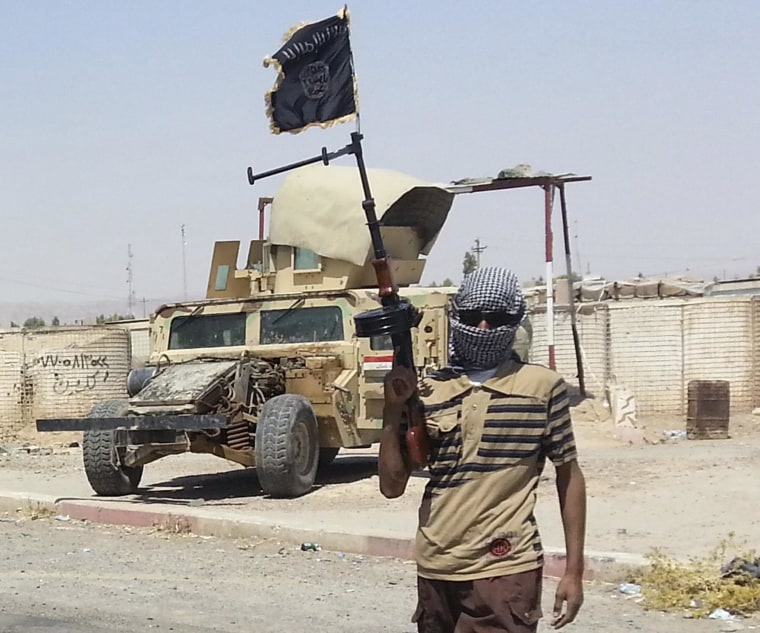How important is Saudi Arabia to the United States as chaos erupts in Iraq? At least two straight days of meetings could give some insight.
Secretary of State John Kerry is in Jeddah on Friday for talks with King Abdullah on the crises around the region, especially the rampaging threat in Iraq from the Islamic State of Iraq and al-Sham (ISIS).
It is the second meeting in as many days with representatives from the kingdom. Kerry also met on Thursday with Saudi Arabia's foreign minister in France.
Both countries have touted the need for cooperation, but little real progress appears to have been made as Iraq continues to descend into chaos.
Here is a rundown on what to expect out of one of our closest, and most enigmatic, partners in the region.
Why is Saudi Arabia so important in this conflict?
Saudi Arabia plays a pivotal role in the Iraq crisis. ISIS fills its ranks and coffers with the help from individual Saudis who share their Sunni heritage, even though ISIS is no fan of Riyadh’s cozy relationship with the U.S.
Iraqi Prime Minister Nouri al-Maliki’s government last week pointed the finger squarely at Saudi Arabia for "supporting these groups financially and morally, and for the outcome of that — which includes crimes that may qualify as genocide,” but the reality is more nuanced.
Saudi Foreign Minister Saud al-Faisal called the accusations “ludicrous.” But while it is highly unlikely that the Saudi government is supporting ISIS in any official way, it is very likely that individual wealthy Saudis are.
Sign up for breaking news alerts from NBC News
According to an analysis this week from the Washington Institute, Saudi donors are encouraged to funnel their money to ISIS through Kuwait.
Saudi Arabia, which already has outsized pull in the region, is also a majority Sunni state. That connection with the ISIS militants could give Riyadh more diplomatic leverage should the militant group ever opt for dialogue over terror and violence.
How could they help fight ISIS?
Turning off all avenues of support coming from their country, whether it’s Saudi nationals joining the group or terror funding, would be a good start.
But some say ISIS doesn’t need any more Saudi money.
They’ve already looted millions of dollars from Iraqi cities, along with ancient artifacts and, more importantly, heavy military equipment captured when Iraqi security forces abandoned their posts.
And earlier this week, U.S. officials told NBC News that while ISIS gets some money from foreign donors, that amount "pales to what they get from extortion, robbery, kidnapping."

What does the U.S./Kerry want from them?
On Thursday in Paris, U.S. Secretary of State John Kerry met with Saudi Foreign Minister al-Faisal, Emirati Foreign Minister Abdullah bin Zayed, and Jordanian Foreign Minister Nasser Judeh.
After the meeting, a senior State Department official said they were asking those countries for help with ISIS in Iraq “as a general matter, although it didn’t come up in these particularly meetings — in our general interactions with these countries, we talk about things like shutting down (ISIS) facilitation networks, funding sources — although we don’t believe that any of these governments at the government level is providing any funding to groups like (ISIS)."
What are the Saudis actually likely to do?
Saudi Arabia has the luxury of not necessarily needing to act swiftly, as it’s highly unlikely that ISIS will soon threaten its borders. Moreover, rising global oil prices as a result of the chaos means the conflict isn't financially hurting the state, and there is little love in Riyadh for the Shiite-dominated Maliki administration.
“Irrespective of fears of a likely ISIS threat, Saudi Arabia shows little interest in supporting the Maliki government,” said Veryan Khan, with the Terrorism Research and Analysis Consortium. “King Abdullah has repeatedly refused to meet with Maliki, as he views the Iraqi president as a puppet in the hands of Iran and Hezbollah.”
“When it looks to the north, it is unclear what the Saudi government sees,” wrote analyst Patrick Skinner from the Soufan Group in an intelligence brief this week. “In the near-term, it is difficult to overstate the deep animosity that Riyadh has towards Tehran. Saudi Arabia likely doesn't want instability on its borders but it might tolerate it for a while if it weakens Iranian influence over Iraq.”
The Saudis are also adding pressure on Iraq to form a new government made up more equally of Shiites and Sunnis.
The State Department official said the ministers at the Paris meeting had “concerns about the lack of inclusivity of the current Iraqi leadership.”
There’s no guarantee, however, that an upheaval in the Iraqi leadership now would lead to anything but more chaos.
What do Saudis have to lose if the conflict gets out of hand?
The Saudis, and all other countries in the region, fear that the conflict could spread like a virus: Radicalized nationals going to the front lines, getting training in terror tactics, then coming home to practice what they learned.
“No doubt they’re cheering the recent Sunni insurgency because they see it as a blow to Iranian ambitions. But the danger is that groups like (ISIS) are also very anti-Saudi,” said Alireza Nader, Senior Policy Analyst with the Rand Corporation.
“There were leaflets passed out in Riyadh (on car doors and windshields) promoting ISIS last month,” added Khan. “The leaflets warned against Muslims with 'fake beards' but are really the enemy,” said Khan. “ISIS sees the House of Saud as corrupt who promotes Islamic rule at home but have close ties to the U.S."